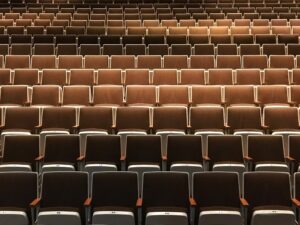As so many others, the culture sector did not escape the impact of the corona virus either. Concerts got canceled, museums closed their doors. The sector reacted quickly and switched to online alternatives. As a result, Prof. dr. Annick Schramme and Nathalie Verboven took part in setting up a large-scale public survey to discover the impact of the crisis on the cultural experience. Will the Flemish people return to the theaters, or is the online alternative here to stay?
The study was set up by Publiq, the Knowledge Center for Cultural and Media Participation (UGent – VUB), the Knowledge Center for Cultural Management and Cultural Policy (UAntwerp) and museumPASSmusées. The first part consisted of a quantitative survey, in which 13.000 people took part. UAntwerp focused on the qualitative aspect by organising three digital focus groups.
“We were pleasantly surprised by the response. It seems to be a golden age for surveys: people who are quarantined have more time to participate. ”
Culture on screen
As soon as the corona measures in the culture sector took effect, online alternatives sprang up like mushrooms. Many respondents tried the virtual offer and were quite satisfied with it. However, it seems the virtual experience will never live up to the real deal. Participants missed the social aspect, they missed having a beer together after watching a show. On the other hand, online culture provides an answer to a number of practical barriers and allows people to discover new things. Some examples:
- The virtual museum experience was quite positive. For many, museum visits are an individual experience, a moment of stillness and reflection. Going to a museum virtually also allows you to get closer to art than ever, for example by zooming in on a painting.
- In general, a concert in the living room proved to be no match for a live performance in a packed concert hall. Young parents however now got to attend concerts that they would otherwise not have been able to without finding a babysitter. And people who have difficulty getting around, such as elderly and disabled people, also enjoyed exploring the online offer and will most likely continue to do so.
Young vs. old
The survey revealed some demographic differences too. Older people tend to be more cautious and are only willing to return to cultural centers if all safety measures are taken, or in some cases, if a vaccine is found.

Younger people are more likely to want to experience culture physically again. For this group, cultural activities equal being social and spending time with friends and family. The online alternatives fall short here. Moreover, this group already spends a large part of their day in front of a screen, so they crave offline relaxation more than anything (such as reading, exercising or listening to the radio).
Finally, it is striking that the participation was high among children, probably as a way to keep busy during the lockdown. Theater and reading sessions were particularly popular among children under the age of twelve.
Virtual culture gap
The degree of cultural participation before the lockdown also played a role. Those who already had a preexisting interest in culture before the crisis, easily found their way to the virtual alternatives. They are even more inclined to pay for it, albeit less than for the ‘real deal’.
“At the same time, we found that those who were not actively involved in culture did not find their way to the virtual offer. The cultural divide was, in a sense, consolidated. ”
It was also striking that the ‘local business first’ principle also applied here. During the lockdown, you could follow an opera in Paris or Milan with just one simple click. Still, most stayed closer to home, following local artists and musea.
Quality over quantity
Slowly and gradually, our cultural and leisure life is starting up again. Musea started reopening, the theaters are soon to follow. The public longs for the restart of the cultural sector. However, the digital alternatives are definitely here to stay. Because the range of webinars, live sessions, etc. has become so large, the sector will have to get creative in how they offer their content. Simply pointing a camera at a piece of art will not suffice.
“We are convinced that the culture sector will have to implement hybrid business models in the future, especially the performing arts. More than ever, they will have to take steps to continue to innovate and improve their offer. ”
In the Master’s program in culture management, we address such issues and challenges. In their Master’s thesis, students can further explore topics such as public research, sustainable business models, partnerships, etc. To this end, they work closely with the cultural centers and thus help shape the future of the Flemish culture sector.
Want to know more?
- Read the entire rapport
- On 30 June Publiq organises a webinar in collaboration with UAntwerp and UGent, in which the results are further discussed. Register now!
- Read the full article in Dutch


